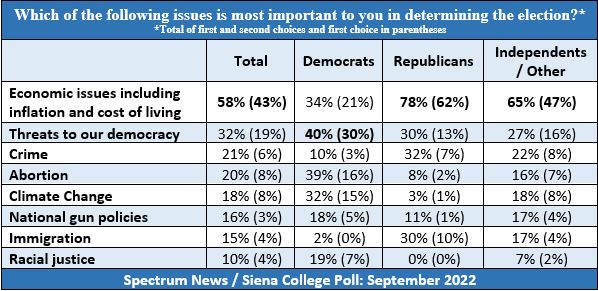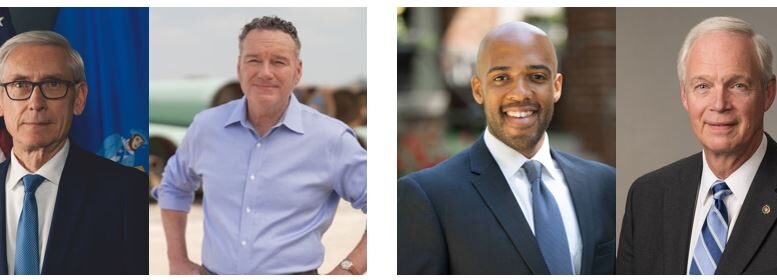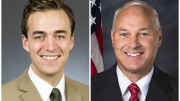Spectrum News / Siena College Wisconsin Poll:
- Evers & Barnes Viewed Favorably by Small Pluralities; Larger Pluralities View Michels & Johnson Unfavorably
- Voters Say Economy Is Most Important Issue in Determining Who to Vote for in November; Threats to Democracy Finish Second
- Overwhelming Support for Universal Background Checks for Guns; Majority Support for Banning Assault Weapons; Opposition to Arming Teachers; Strong Opposition to SCOTUS’ Dobbs Decision Overturning Roe v Wade
Loudonville, NY. Less than two months from Election Day, Democratic Governor Tony Evers has a five-point, 49-44%, lead over Republican challenger Tim Michels. In the race for the US Senate, incumbent Republican Ron Johnson and Democratic challenger Mandela Barnes are separated by one point, as Barnes has the support of 48% of voters and Johnson has the support of 47%, according to a new Spectrum News/Siena College poll of likely Wisconsin voters released today.
Evers has a 47-43% favorability rating, while Michels has a negative 32-43% favorability rating, with one-quarter of voters either not knowing him or having an opinion about him. Johnson has a negative 37-50% favorability rating, compared to Barnes’ 41-39% favorability rating. Economic issues are at the top of the list for 43% of voters as they determine their vote this year, followed by threats to our democracy, the top issue for 19%, and no other issue hit double digits.
“Governor Evers, who won a tight one-point race against former Governor Scott Walker four years ago, has a five-point lead with seven weeks until Election Day. Evers has the support of 96% of Democrats and Michels has the support of 91% of Republicans, while independents tilt toward Michels by two points,” said Steven Greenberg, Siena College pollster. “Men favor Michels by eight points and women give Evers a 20-point lead. Evers dominates in Milwaukee and Madison’s Dane County. The rest of the southern part of the state is closely divided, while Michels has a double-digit lead in the north.”
“Evers’ favorability rating is on the positive side – barely, 47-43% – however, Michels’ favorability rating is underwater, 32-43%, and he is unfamiliar to nearly one-quarter of voters,” Greenberg said. “Whereas Evers is viewed favorably by 88% of Democrats, Michels is viewed favorably by 67% of Republicans. Ironically, they’re both underwater with independents, Evers by eight points and Michels by 12 points.
“While Senator Johnson won his last two elections, both over former Senator Russ Feingold, 50-47% in 2016, Lt. Governor Barnes is giving him a run for his money,” Greenberg said. “Similar to the race for governor, both candidates are doing a great job of dominating in their party, and independents favor Johnson by five points. This race also has the same gender and regional dynamics as the race at the top of the ticket. Interestingly, Barnes leads by double digits with both voters under 35 and those 65 and older. They tie among the younger middle-aged voters, while Johnson leads by 11 points with voters 50-64.
“Despite Barnes’ favorability being underwater with independents by 10 points, his 80% favorability with Democrats pushes him into slightly favorable territory overall. Johnson, also underwater with independents by 10 points, suffers from being viewed unfavorably by 88% of Democrats, while being viewed favorably by 75% of Republicans. Johnson has a breakeven favorability with men but twice as many women view him unfavorably rather than favorably,” Greenberg said.
Economic Issues Dominate Voters’ November Decision Making
Voters were asked their most and second most important issues in determining their vote in November. Here are the results based on top two issues (single most important is parentheses):

“Economic issues are by far the dominant election issues for Republicans and independents, however, Democrats put threats to democracy in the top spot. While abortion doesn’t make it into the men’s top five issues, it’s third most important for women, behind economic issues and democracy,” Greenberg said.
Huge Yes for Background Checks; Yes for Assault Weapon Ban; No to Arming Teachers
Wisconsinites support mandating universal background checks, 87-10% (74% strongly support). They support banning assault-style weapons, 54-43% (44% strongly support). And they oppose arming teachers in schools, 55-41% (42% strongly oppose).
“Universal background checks is one of those rare issues in today’s politics that generates strong bipartisan backing, as it is supported by 98% of Democrats, 83% of independents and 83% of Republicans,” Greenberg said. “Banning assault style weapons is supported by 85% of Democrats, while independents are evenly divided and 71% of Republicans oppose such a ban.
“Arming teachers in schools is supported by more than two-thirds of Republicans, while it is opposed by 53% of independents and 85% of Democrats,” Greenberg said. “Women oppose arming teachers by 22 points and men oppose it eight points.”
Voters Oppose Dobbs Decision 2-to-1; Overwhelmingly Want New WI Law – Majority Closer to Roe
By a 62-31% margin, voters oppose the Supreme Court’s Dobbs decision overturning Roe v Wade. Overwhelmingly, voters say they want a new abortion law in Wisconsin (72%) rather than relying on an 1849 law that prohibits abortion. Only 5% want a law to prohibit all abortions; 37% want a law to prohibit all abortions, except in cases of rape or incest, or the mother’s life; 29% want a law allowing abortion up to 20 weeks of pregnancy; and 22% want a law allowing abortion up to and beyond 20 weeks.
“Although 60% of Republicans support the Dobbs decision, 59% of independents and 93% of Democrats oppose overturning Roe, as do 67% of women, 56% of men, and 72% of voters under 35,” Greenberg said. “Similarly, 94% of Democrats and 72% of independents want a new Wisconsin abortion law and not have to rely on the 1849 law prohibiting abortions, while Republicans are closely divided.
“There’s less unanimity among Wisconsinites on what a new abortion law should look like. A plurality of voters, 37%, say they want to ban abortion except to protect the life of the mother and in cases of rape or incest, including 65% of Republicans and 42% of men,” Greenberg said. “However, a combined 51% of voters want legal abortions up to 20 weeks of pregnancy (29%) and beyond (22%), including 80% of Democrats, 49% of independents, and 54% of women.”
Divided Wisconsin Favors Divided Congress; Most Voters Will Trust ’22 Election Results, Not Reps
Looking to the outcome of the midterm elections nationally, 36% of voters want to see the Republicans control both houses of Congress, 36% want the Democrats to control both houses, and 23% want each party to control one of the Congressional chambers. By a 64-30% margin, voters say they will be able to trust the accuracy of the 2022 election results.
“Three-quarters of Democrats want their party to control both the House and the Senate, while 83% of Republicans want the same for their party. Not surprisingly, a plurality of independents say they want a divided Congress. By 13 points men want Republicans to control both and by 13 points women want Democrats in control of both,” Greenberg said.
“Nine in ten Democrats and nearly two-thirds of independents say will be able to trust the accuracy of the 2022 election results, as do a majority of men and women, young and old, as well as voters from every region of the state,” Greenberg said. “The only outliers are Republicans, who by a 55-42% margin say they will not be able to trust the accuracy of the results this year.”
Odds & Ends
- A plurality of voters say Wisconsin is headed in the wrong direction, rather than on the right track, 48-33%. Democrats think the state is on the right track but Republicans and independents say the state is headed in the wrong direction.
- Nearly two-thirds say the country is headed in the wrong direction, 65-27%. Democrats think the country is on the right track, while Republicans and independents strongly say wrong direction.
- Voters are mixed on the recent Biden Administration plan to cancel some student debt, with 51% opposing it, compared to 45% who support it. Democrats overwhelmingly support it, while Republicans overwhelmingly oppose it, as do a majority of independents.
- By a 57-24% margin, voters want to see an independent commission conduct redistricting in Wisconsin, and not the legislature. A majority of Democrats and independents agree, as do a small plurality of Republicans.
- Increasing teacher pay – even if it means paying higher state and local taxes – is supported by more than two-thirds of voters, 68-28%. Democrats support 90-8%, independents 64-32%, and Republicans 50-46%.
- When it comes to PFAS, 34% say it’s a very or somewhat serious problem, compared to 40% who say it is not very serious or not serious at all. Voters in Milwaukee and Dane County are most likely to see PFAS as a serious problem.
- Sixty percent of Wisconsinites say they have to cut back given the cost of living today compared to a year ago, while 35% say they have continued to have the same lifestyle and 5% say they are living better than they were a year ago. Leisure spending took the biggest hit; healthcare the least. Majorities say they’ve cut back on groceries and savings.
###
This Spectrum News/Siena College survey was conducted September 14-15, 2022 by telephone calls in English to 651 likely Wisconsin voters. Telephone sampling was conducted via a weighted stratified dual frame sample of landline and cell phone drawn from the L-2 database of registered voters. Data was statistically adjusted by age, race/ethnicity, education, regional vote pattern in the 2020 election, a combined measure of stated and derived vote likelihood, and gender to ensure representativeness. It has an overall margin of error of +/- 4.5 percentage points including the design effects resulting from weighting. The Siena College Research Institute, directed by Donald Levy, Ph.D., conducts political, economic, social, and cultural research primarily in NYS. SCRI, an independent, non-partisan research institute, subscribes to the American Association of Public Opinion Research Code of Professional Ethics and Practices. For more information, call Steve Greenberg at (518) 469-9858. For survey crosstabs: https://scri.siena.edu/category/spectrum/





